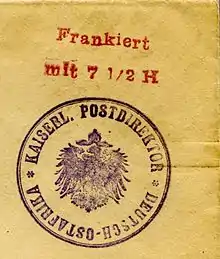Indicia (philately)
In philately, indicia are markings on a mail piece (as opposed to an adhesive stamp)[1] showing that postage has been prepaid by the sender. Indicia is the plural of the Latin word indicium, meaning distinguishing marks,[2] signs or identifying marks.[3] The term imprinted stamp is used more or less interchangeably,[1] but some indicia are not imprinted stamps. One example is the handstamp, which can be seen in a photo on this page.



Forms of indicia
Indicia can take a number of forms, including printed designs or handstamps where a stamp would normally be that indicate the pre-payment of postage. Imprinted stamps on postal stationery are indicia.[4]
The term also refers to a meter stamp impression[4] or the part thereof that indicates the value or postal rate.[5]
References
- "Miller, Rick; The language of cover collecting in Linns.com Refresher Course section".
- Room, Adrian., ed. The Cassell Dictionary of Word Histories. London: Cassell & Co., 1999, p.306.
- "Wunderly, Kathleen; Foreign words spice up stamp collecting in Linns.com Refresher Course section". Archived from the original on 2015-05-04. Retrieved 2010-12-03.
- Carlton, R. Scott. The International Encyclopaedic Dictionary of Philately. Iola WI: Krause Publications, 1997, p.117. ISBN 0-87341-448-9.
- Mackay, James. Philatelic Terms Illustrated. 4th edition. London: Stanley Gibbons, 2003, p.71. ISBN 0-85259-557-3.